'He Genuinely Cares': Joe Cobb, Proudly Spiritual and Gay, Sees Progress in Roanoke Mayor Bid
Openly gay and deeply spiritual, Cobb has focused on tackling two of Roanoke’s thorniest issues: gun violence and public transit.
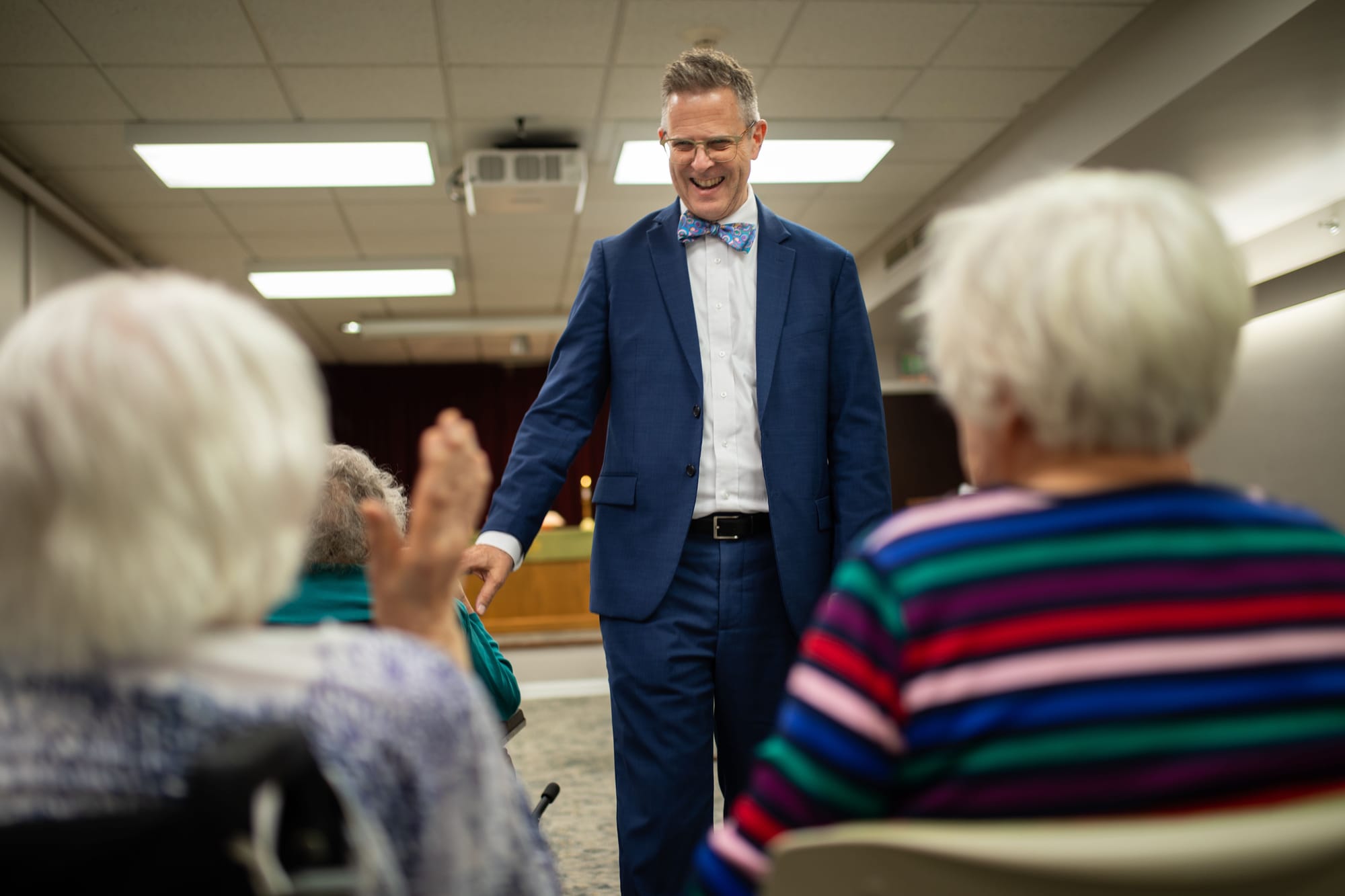
Wearing a bow tie with rainbow polka dots, dress shirt and slacks, Joe Cobb walks door to door off Williamson Road in 82-degree heat.
He would normally canvas in shorts and a T-shirt, Cobb admits, but he’s rushing afterward to a memorial service for a young woman who used to attend the Metropolitan Community Church of the Blue Ridge, where Cobb served as pastor for eight years before entering politics.
“I’m Vice Mayor Cobb,” Cobb says at his first door.
“I recognize you,” the resident, an older Black man, says. The man tells Cobb he recently retired from the Virginia Department of Corrections, where Mayor Sherman Lea spent his career.
“I recognize you being side-by-side with Mayor Lea,” the man tells Cobb, “and I thought he did a good job.”
Cobb, 62, is now seeking to succeed Lea, dropping that “vice” from his honorary title, which he first earned in 2018 in his inaugural City Council campaign by winning the most votes. Four years later, he repeated the feat. Though Roanoke trends Democratic, this may be Cobb’s toughest race yet as he faces two opponents with longtime name recognition who could split the vote: independent Councilwoman Stephanie Moon Reynolds and former mayor, and newly Republican, David Bowers.
An openly gay and deeply spiritual man, Cobb has focused his Council efforts on two of Roanoke’s thorniest issues: gun violence and public transportation. Cobb spearheaded the creation of the city’s Gun Violence Prevention Commission, which has secured millions in grants to create a youth and gang violence prevention coordinator and rapid response team. But the commission has also faced criticism — including from Lea and Cobb’s two mayoral opponents — over some of its spending decisions and a sense that not enough was being done to curb a post-pandemic uptick in shootings, which has since declined in the last year.
Cobb also serves as board president of the Greater Roanoke Transit Company, and advocated for using pandemic relief funds to pilot late-night and Sunday on-demand service.
“I really want to keep the momentum and innovative spirit of our city going,” Cobb tells a voter at another door.
What Cobb may most be known for, however, is how he is everywhere. On social media, Cobb documents his appearances at festivals, events, meetings, trash pickups and galas. During National Night Out, Cobb visits a dozen neighborhoods in the span of a few hours.
Politically, his recognizability pays off.
Near Williamson Road, a FedEx van honks as Cobb crosses the street. “Hey Joe, you got my vote, brother!” the driver, a younger Black man, shouts. Just behind the van, a baby blue electric car whirs up to a stop sign.
“You got this, Joe!” The driver, an older white woman, steps out. Cobb recognizes the friend from South Roanoke and goes over to chat. A staunch liberal, the woman says she’s scared of the potential outcome of the presidential election. Cobb assures her to keep the faith.
“I’m a very optimistic person,” Cobb tells her, “and I focus on ideals, because that’s what keeps me hopeful.”
'A complete shift in my life'
Cobb was born at the Willows Sanitarium for Unwed Mothers in Kansas City, Missouri. He grew up in Wichita, Kansas, one of four adopted children in what Cobb describes as a loving, Christian family.
When starting Southwestern College in nearby Winfield, Cobb was going to double major in accounting and music. That all changed one day when he was attending an annual United Methodist Church meeting to give a report about a recently started youth ministry.
“I had this kind of surreal experience, where I felt a very holy, sacred presence and a voice, an inner voice, that said, ‘I want you to be a pastor,’” Cobb said. “And it wasn't my voice, it was a spiritual, divine voice, and it was so compelling to me that I just felt a complete shift in my life.”
Cobb switched his coursework and interned in area churches, finishing college a year early before going to seminary at Southern Methodist University in Dallas. That’s where he met Leigh Anne Taylor.
“He just seemed like a fun person to be around,” recalled Taylor, who grew up in Shawsville and is now a deacon at a church in Lynchburg. “He was friends with everybody.”
The two married in 1985 and had a son and daughter. Cobb had been ordained, and the couple worked as ministers at a Methodist church in Kansas.
But the gnawing sense that Cobb was gay broke to the surface in 1997; he confessed to Taylor that a year before, he had an encounter with a man at a national singles ministry meeting, according to a book he and Taylor published in 2011, “Our Family Outing: A Memoir of Coming Out and Coming Through.” Cobb’s previous relationships had all been with men, including one when he was 17 with a man in his late 20s, which Cobb would later recognize as exploitative.
The couple divorced. Cobb, who could not serve as an ordained United Methodist Church minister and be openly gay, relinquished his credentials. At one point, reexamining his vocation, Cobb spoke with his freshman roommate.
“He remembered a conversation we once had about my entering the ministry,” Cobb writes in the memoir. “‘Are you doing this to get away from your sexuality?’ he had asked. ‘Yes,’ I answered.”
But then, in recounting this memory in therapy, Cobb makes space for the opposite conclusion: “Then I wondered, having been active in ministry for eighteen years, had the ministry been a ‘running away from’ or a ‘coming home to’ the person God created me to be?”
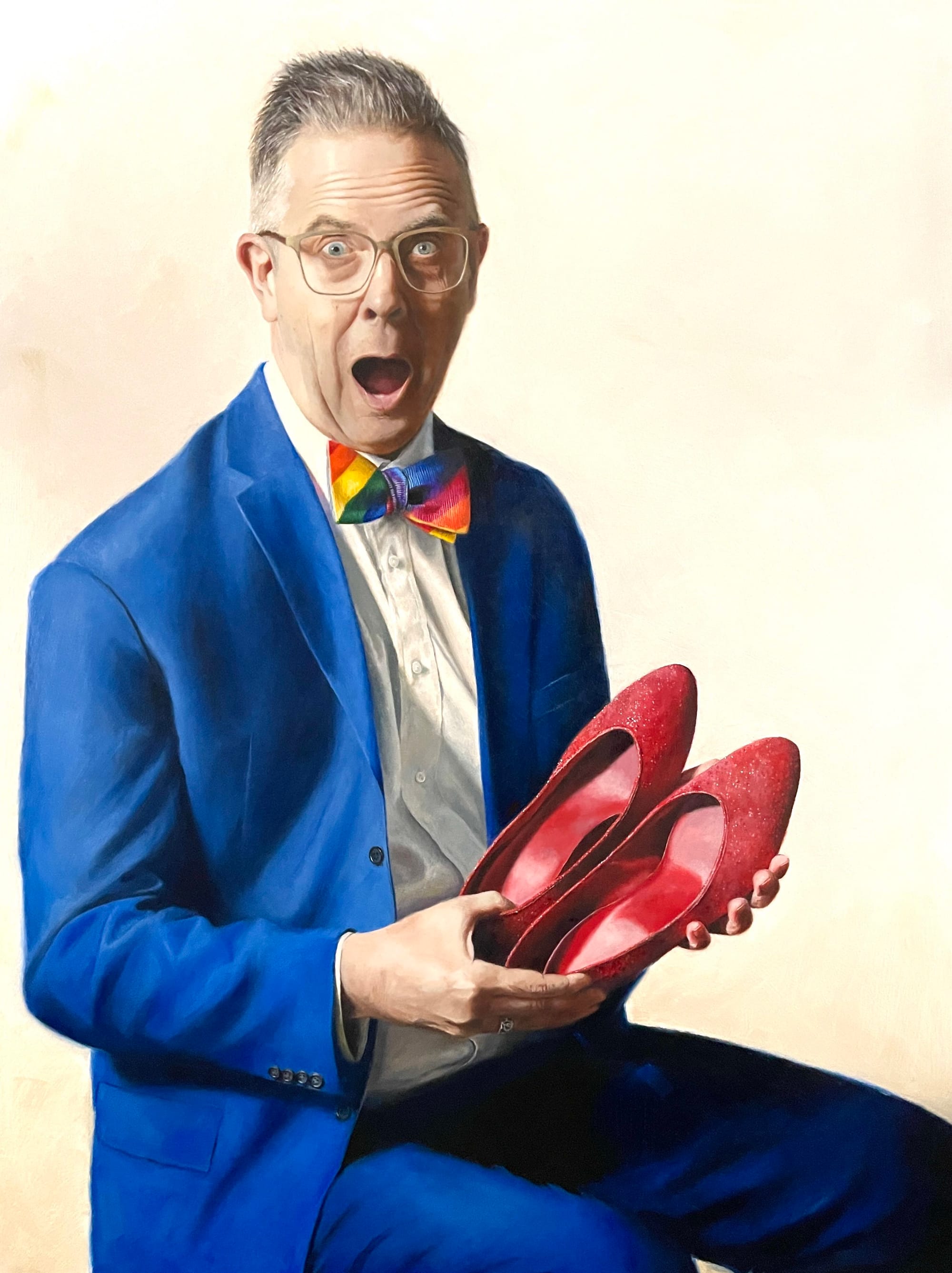
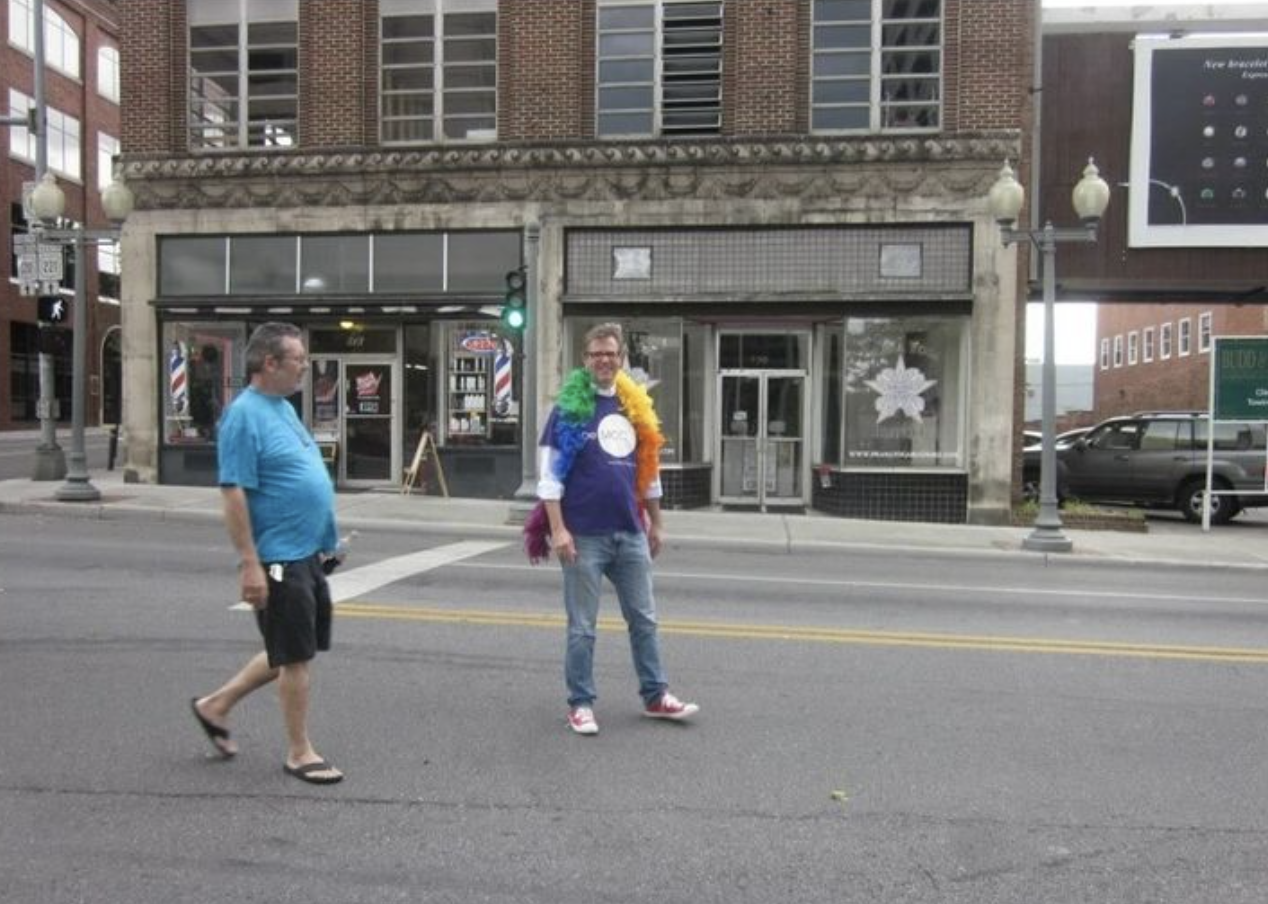
When he first preached at Metropolitan Community Church, Cobb used ruby red slippers, a reference to The Wizard of Oz, as a prop to symbolize his new life in Roanoke. Above left, a painting of Cobb by Roanoke artist Whitney Brock alludes to the story. Above right, Cobb, at right, marches in a Roanoke City Pride Parade in September 2015. When Cobb announced his bid for City Council in 2018, The Roanoke Times described him as “perhaps Roanoke's most recognized gay man and LGBTQ advocate.” LEFT, IMAGE COURTESY OF WHITNEY BROCK. RIGHT, IMAGE COURTESY OF SAMANTHA ROSENTHAL
'To make right what's wrong'
After the divorce, Taylor moved to Blacksburg with their children. To be closer to his kids, Cobb moved to Roanoke in 2001 as a stranger. He soon met his now-husband James Matthews (the couple has two school-aged children) and immersed himself in the community.
Cobb became marketing director for the Roanoke Symphony Orchestra. Two years later, he became executive director of Interfaith Hospitality Network, now called Family Promise of Greater Roanoke, which helps families facing homelessness.
Cobb started attending the Metropolitan Community Church, an LGBTQ-affirming denomination, and was invited to preach. To celebrate, he had three friends to dinner and they glittered a pair of ruby red slippers. The Wizard of Oz is something of a gay cultural touchstone, in which Dorothy leaves black-and-white Kansas for a technicolor world with fabulous new friends.
Cobb used the slippers as a prop in his sermon, “as a symbol of my new life,” he writes in the memoir. (It's also the story behind Cobb’s vanity license plate, which reads, RUBY REV.)
On the campaign trail, Cobb tells how a year before he moved to Roanoke, a man intent on harming gay people walked into Backstreet Café and started shooting, killing one person and injuring six others.
“I didn’t know if Roanoke was a place where I could live authentically, where I could live safely, where I could thrive,” Cobb said at a forum this month in the Greater Deyerle neighborhood. The moderator had asked mayoral candidates to write down one word to describe the legacy they wished to leave as mayor and Cobb held up a paper that read, “Inclusive”.
The shooter had said he wanted to “‘waste some gays,’” Cobb said. “Take out the word ‘gays’ and put in whatever.” Cobb expressed pride that Roanoke has increased its equality score from the Human Rights Campaign, an LGBTQ advocacy group, to a perfect grade.
“That’s because our city cares about creating an inclusive environment for everyone who lives here and calls this place home,” Cobb said. “Whether it’s someone in the LGBTQ community, someone who’s an immigrant, someone who’s a refugee, someone who is Asian or Hispanic or African American. This is a place where people can feel at home and be at home and thrive. And that’s what I would like for my legacy to be.”
Taylor paused when asked what she thinks drives Cobb to do the work he does.
“I think Joe has a way of seeing all the people, and especially seeing the people that others might overlook,” she said. “If I would say there’s a driver, it’s the drive to make right what’s wrong. … I suspect that’s informed by being in a population that’s discriminated against, but instead of making him bitter, or the victim, it’s made him an advocate.”
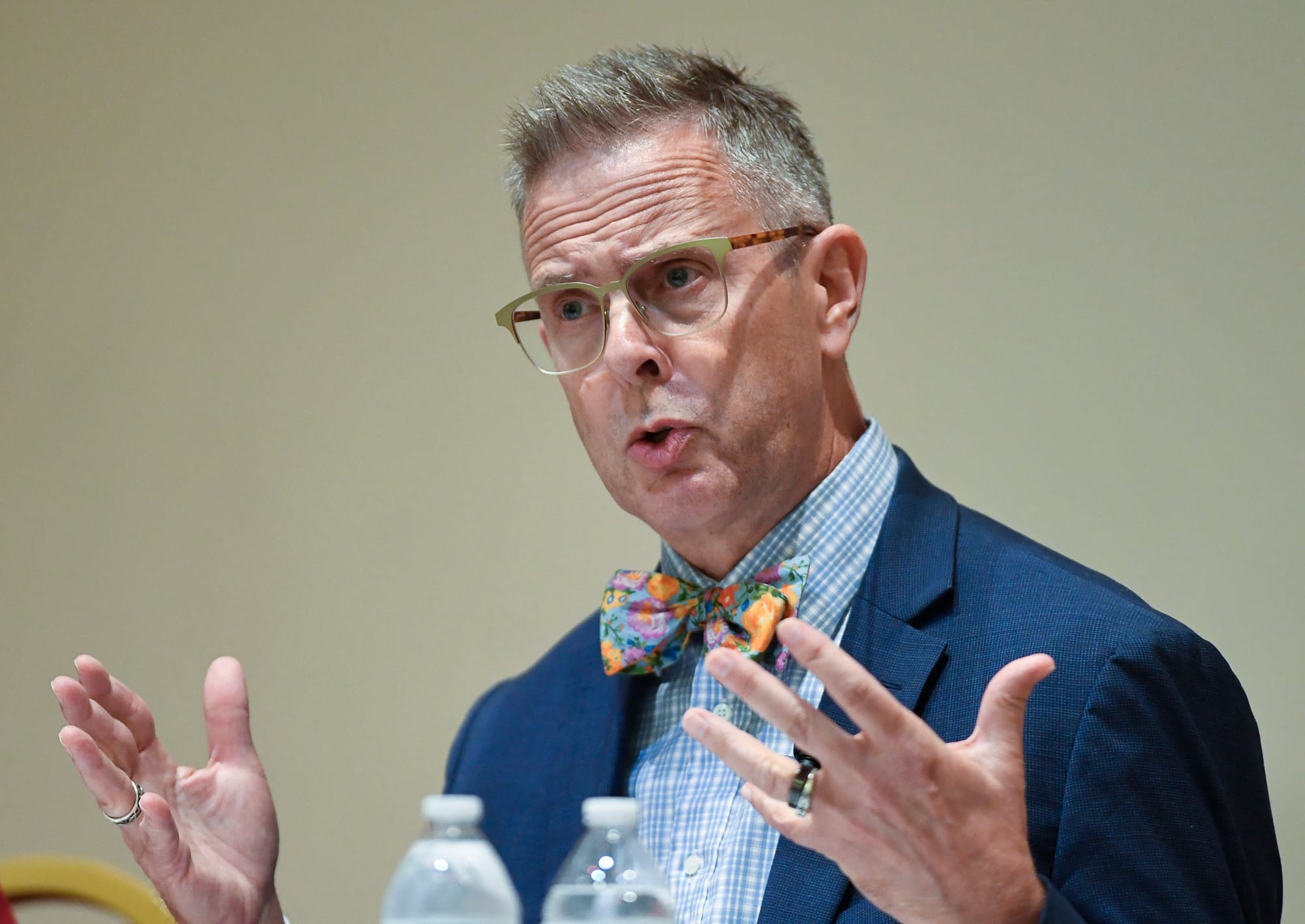
'A Mister Rogers figure'
As pastor of the Metropolitan Community Church from 2009 to 2017, Cobb became increasingly visible as same-sex marriage rights advanced and he officiated ceremonies. When Cobb announced his bid for City Council in 2018, The Roanoke Times described him as “perhaps Roanoke's most recognized gay man and LGBTQ advocate.”
Liz Anderson was living at the Roanoke Rescue Mission when she first heard Cobb preach as a visiting minister in the late 2000s.
“I’m going, ‘This is unique, this is something different and this is just around the corner from the Mission,’” Anderson recalled Sunday after an MCC service, now held at a Roanoke County church. She became a deacon. Eventually, she observed Cobb’s vision for the social justice mission of the church outgrew the congregation.
“He’s emulating Jesus in a slightly different way,” Anderson said. “We have a guy who’s not sitting on a pedestal if he becomes mayor.”
Samantha Rosenthal, a Roanoke College professor who has written a history of LGBTQ Roanoke, described Cobb as extremely generous with his time and genuinely interested in everyone’s stories. She recalled jogging past Cobb’s Old Southwest manse just before sunrise recently and spotting him on the porch with a cup of coffee and his laptop, “looking like he was hard at work, furiously at work.”
“I just thought, ‘That’s our mayor,’” Rosenthal said. “That’s our future mayor.”
Mayor Sherman Lea said Cobb’s sense of caring is not a political act.
“I’ve been on Council for 20 years. I’ve never seen another councilman spend as much time working with the underserved community as Joe Cobb has,” Lea said. “And some people say, ‘Well, you know, he’s a politician.’ We always get the, ‘Hey, you’re doing that because it’s political.’ He genuinely cares.”
The ravages of gun violence is one such trauma that Cobb cares about. In 2019, he spearheaded a task force to tackle the issue that became a permanent city commission.
Since then, the city has earned millions in state grant money to hire a coordinator who steers youth away from gangs, establish a rapid-response team to shootings, distribute free gun locks, provide counseling services and connect those injured by shootings to key resources.
Police Chief Scott Booth, who arrived last fall from Danville, cited that infrastructure as an appealing part of seeking the Roanoke job. Rates of homicide and shootings have fallen in the last year.
Still, the commission has faced intense scrutiny as critics pan the efforts as out-of-touch, touchy-feely or riddled with financial conflicts.
In 2022, an audit found Cobb sought to use grant money for a museum outing and dinner at bloom restaurant for contractors who completed a youth and gang violence report. Cobb had received an initial OK for the expense, but state officials later said no. Cobb reimbursed $883 to the city. A year later, another audit found shortcomings in how city staff monitored grants awarded to local nonprofits and churches, some of whose programs auditors could not confirm happened.
Rabbi Kathy Cohen, who chairs the commission, said city staff have learned from the audit to do better grant reporting. She thinks Cobb doesn’t get enough credit for the group’s success.
“Bad news sells and good news doesn't,” Cohen said. “So here we are at a point in Roanoke where we've had this tremendous, unheard of reduction in gun violence over the past 12 months, and last year, every time the commission met, there were TV stations, newspapers, everybody was there and reporting on it. This year, everything's good, and there's no reporting.”
Improving public transportation is another issue which Cobb has stressed as a vehicle for social justice. A two-year pilot project, funded by federal pandemic relief funds, now provides on-demand service for residents in the evenings and on Sundays for the first time in decades.
Laura Hartman, founder of Bus Riders of Roanoke Advocacy Group, said Cobb has been a champion of transit the whole time she’s known him.
“He’s kind of a Mister Rogers figure. He’s sort of congenial and present and does these very kind of do-goody activities,” Hartman said. “He does seem to be everywhere. There is an important event happening, Joe Cobb is there. I hope that’s mostly because he wants to accompany people and be a presence, rather than promote his brand and be seen, but maybe it’s both.”
It’s perhaps that do-goody reputation that has led some Republicans to refer privately to Cobb as “Fluffy Joe,” seeing him as full of buzzwords but without substance. It may also be why the Business Leadership Fund, a PAC of the Roanoke Regional Chamber of Commerce, endorsed both of Cobb’s opponents for mayor. (Lee Wilhelm, chairman of the group, did not respond to multiple messages in the last week; the PAC’s website says current Council members “have been key figures in various committees, such as the Gun Violence Taskforce and initiatives addressing homelessness” and that “their tenure has been marked by inaction and ineffective solutions.”)
“I think they’re trying to encourage people to vote for anyone but me,” said Cobb, who noted he was recently cut out of a recurring roundtable convened by Wilhelm to talk about issues with homelessness that businesses were facing downtown. “I’ve always been available to any business leader to talk about those things, and it was just disappointing to me how that kind of unfolded.”
Some homeowners have also castigated Cobb over his support of reforms that ended exclusively single-family zoning. The change, meant to spur development and reduce economic and racial disparities, has prompted two lawsuits and become politically toxic, with nine of the 10 mayoral and City Council candidates expressing opposition to the policy.
Former councilwoman Djuna Osborne said Cobb has “an extraordinary capacity” to “hold his own point of view while holding space for other people to express their point of view.” She said that can sometimes come across as a lack of conviction or attempt to please too many constituencies.
But Osborne said it’s because Cobb cares so much about others’ diverse viewpoints. Osborne also said she thinks Cobb’s decision-making process has improved, both points that Lea echoed.
“He has difficulty making decisions because he cares,” Lea said. “The thing I like about Joe is that he’s indecisive, but he’s just not saying, ‘Okay, I’m not going to vote for this and go on my way.’ He’s going to work hard to make sure, behind the scenes, that everybody can get along or work through what they’re doing.”
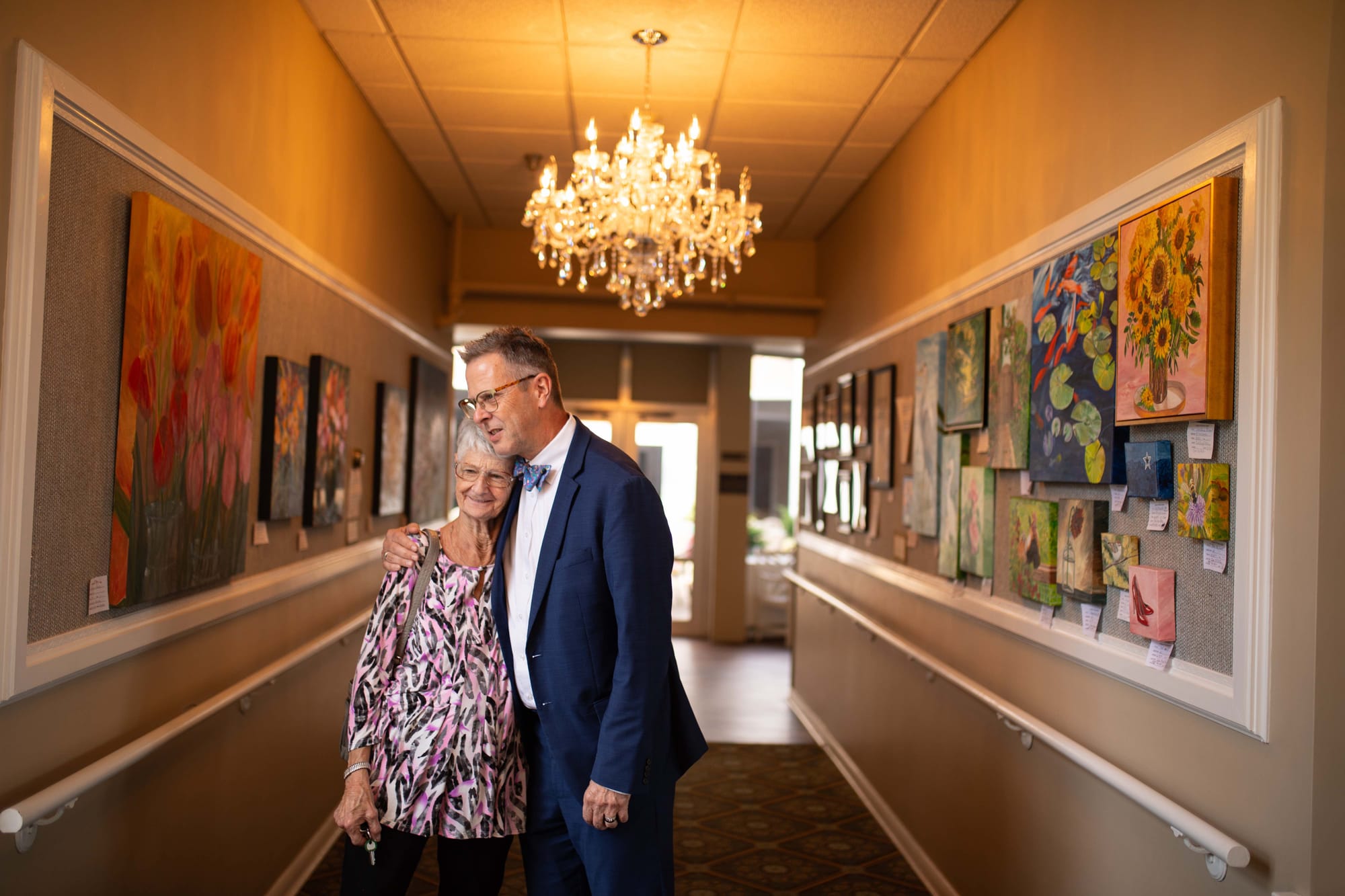
'Go and sit with someone'
Cobb walks down the hall at Hermitage Roanoke, a retirement community where he works as a part-time chaplain. Having completed a doctorate last year — on the removal of bodies from the historically Black Old Lick Cemetery during urban renewal — he is now the Rev. Dr. Cobb.
Shoulders back and eyes bowed to watch his shoes, Cobb makes his way down a stairwell and through another hallway to a room with 18 residents waiting patiently.
It’s Sunday afternoon service, and Cobb’s sermon is focused on the Biblical figure Job.
“It’s not a real pick-me-up story,” Cobb says. “It’s not a ‘Hey, I read Job today, and I feel really great.’” Quiet chuckles.
Two recent storms, hurricanes Helene and Milton, caused significant damage and loss of life. Such devastation leads us to reflect on human suffering.
“There was once a man in the land of Uz — not ‘Oz’ — whose name was Job,” Cobb says. “That man was blameless and upright, one who feared God and turned away from evil.”
In the story’s first chapter, Job experiences mounting tragedies as messengers report the deaths of his oxen, sheep, camels and finally his children. Satan wagered God that by inflicting such pain on Job, he would curse God. But instead, Job falls to the ground and blesses the Lord.
Cobb said the story invites the listener to enter its world, whether we see ourselves as Job, as one of his friends or as a bystander trying to make sense of suffering. Too often, Cobb tells the residents, suffering leaves us alone, afraid, uncertain. When four friends visit Job, they each come up with a reason for why misfortune fell upon him.
“The interesting thing is, none of the friends just comes to sit with him, and I found that one of the greatest gifts that any of us can give to someone who is going through such intense suffering is to simply sit with them, to be with them,” Cobb says. “I learned a long time ago, when I was training to become a pastor, that sometimes the only thing you need to do is go and sit with someone, and sometimes it's better to not say anything than to say something you might regret later.”

